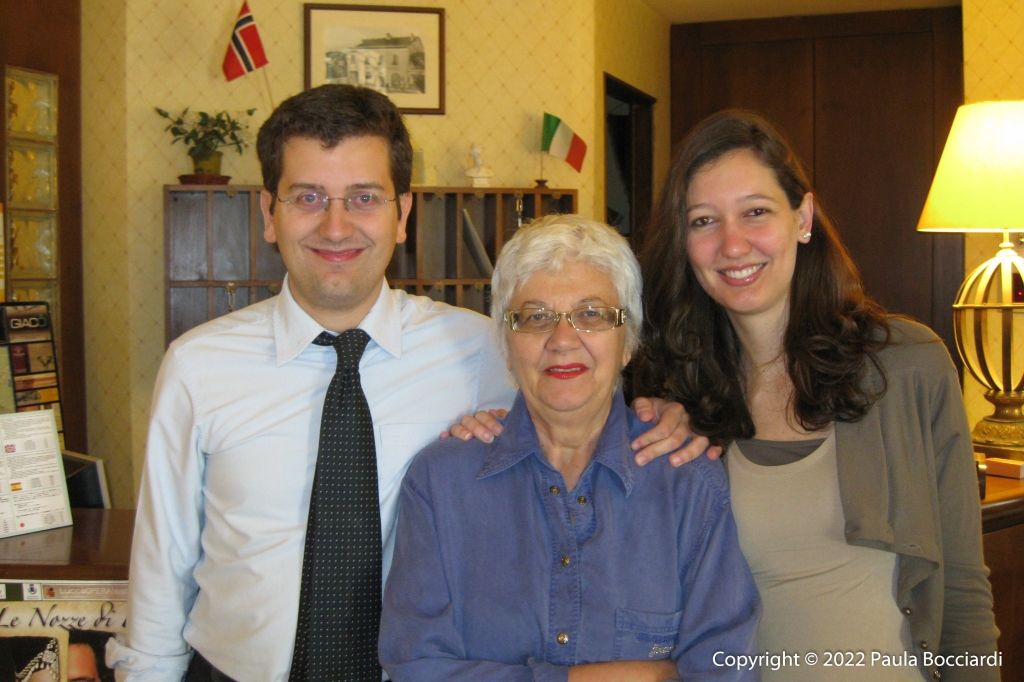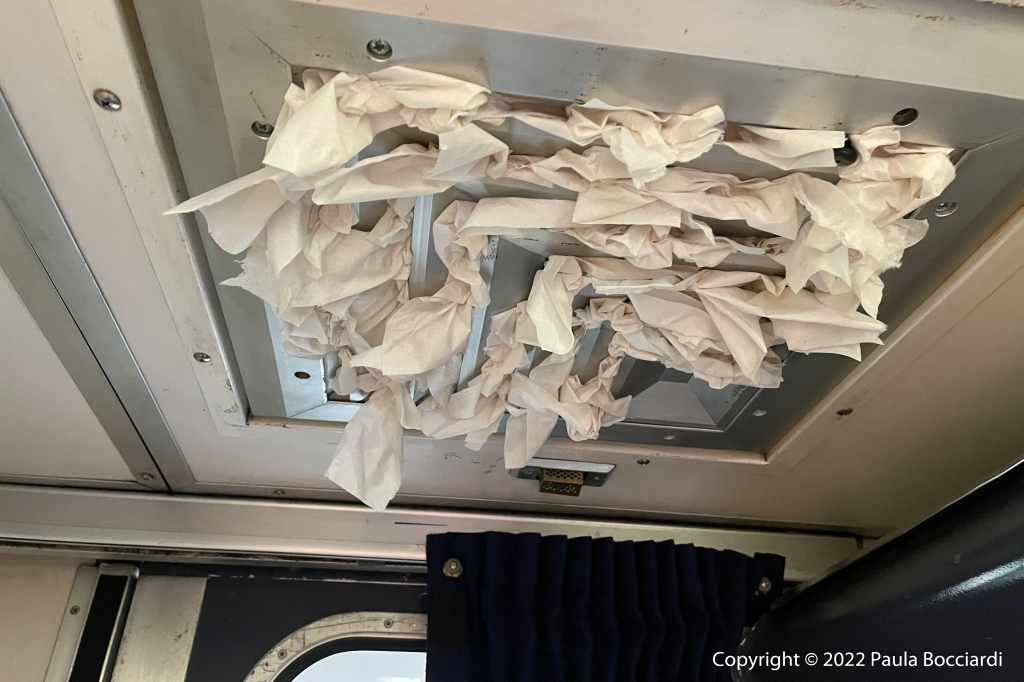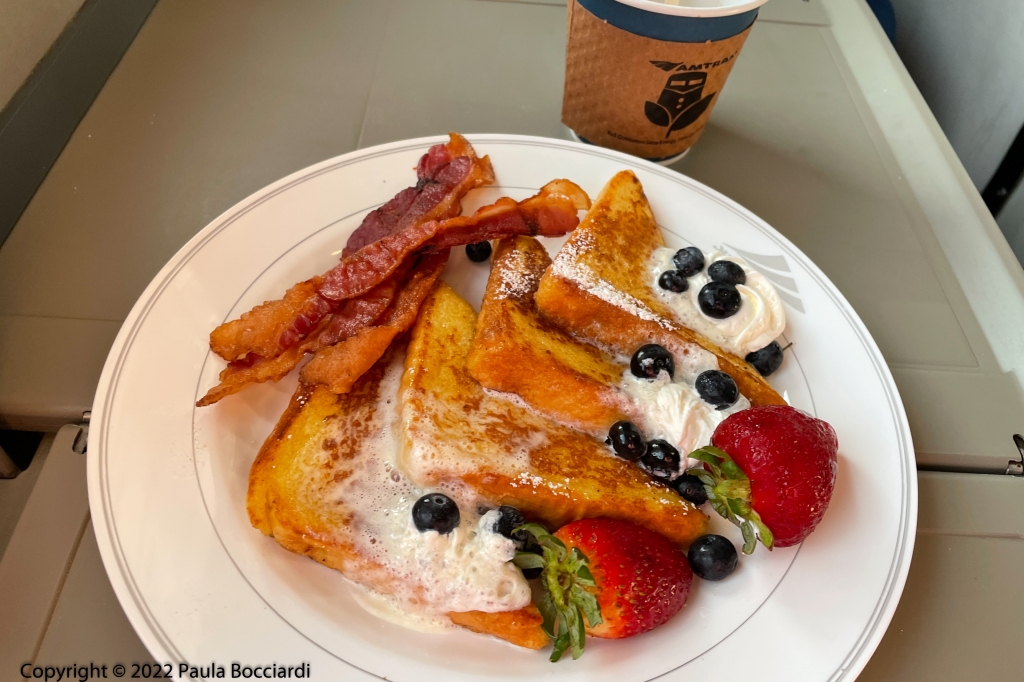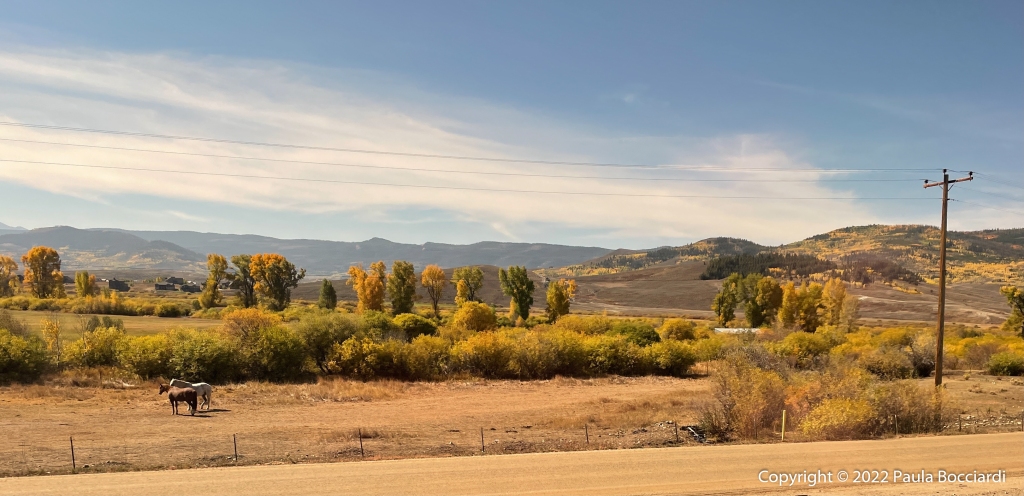A few years ago I was staying at a small family-run hotel in Lucca, Italy, near my grandparents’ birthplace. The daughter, Giulia, had just spent a few days across the border in Switzerland and was entertaining her brother Giovanni with an anecdote about a Swiss train station. They were howling with laughter. Giulia apparently had been waiting on the platform when the Swiss passengers around her suddenly grew enraged, barking angrily at their watches. It was practically an insurrection.
The reason for all the anguish?
The train was 3 minutes late.
The cultural difference between these two countries, adjacent to each other, is astounding, and I understood the Italians’ amusement. In Italy, structure and punctuality mean nothing. It’s perfectly normal, for example, for restaurants to open 45 minutes later than their posted hours; no one bats an eye. Highway lane lines are “merely suggestions.” And the train system is seemingly unconcerned about timetables.
The Swiss, on the other hand, make some of the world’s best watches. They are just . . . precise.
Despite my Italian last name, large nose, and tendency to weep without provocation, I fear that I inherited the lion’s share of my DNA from my Germanic mother. I crave order and precision and am happiest when I am organizing something. Please don’t throw me a curve ball. Inconsistency terrifies me.
Except when I’m on a train.
***
Normally I don’t let much time elapse between Amtrak rides, but it had been three years since my last trip when I decided to hop aboard the California Zephyr in September. It would be my usual ’cross-country trip to Maryland, with a train change in Chicago. But this time it was in the middle of COVID.
I’d been extremely careful throughout the pandemic. I rarely went anywhere, depended on food deliveries, saw friends and family mainly through Zoom calls, and had a mask glued to my face.
But by September 2021, I was vaccinated and the omicron variant had not yet emerged. In Baltimore it was going to be hot as blue blazes, so I knew I could eat my meals outdoors. And my friends out there were all perfectly fine with my getting off a long-distance train and dragging all kinds of germs with me. So I decided to take a chance and finally use my twice-postponed ticket.
***
It is impossible, on Amtrak, to be Swiss. It demands, instead, that you be Italian. On a train, you have to roll (sometimes literally) with each moment. The Amtrak experience requires the utmost in patience and flexibility. Nothing is consistent; very little is predictable.
Consider, for example, the temperature on board, which, by the way, has absolutely nothing to do with the time of year. On this trip, the conditions in my room ranged hourly from sauna to meat locker. Most of the time it was like the frozen Yukon in there. I had brought a light fleece on board, but it was no protection against the frigid air blasting from the ceiling vent, despite my moving the vent lever to the “closed” position. (By the way, the sleepers also have useless “temperature controls” that have not worked since Jimmy Carter was President. Yes, some of these cars are nearly 50 years old.) I ended up stuffing an entire box of Kleenex (something useful that Amtrak actually provides!) in between the vent slats. That method helped mitigate the arctic conditions until nighttime, when the room inexplicably became an inferno. And on it went.
The in-room showers are not all that functional, either. One prevailing problem is that the water drains so slowly that it accumulates and begins leaking under the bottom of the door into the room itself. On this trip the drainage was virtually nonexistent, and to make matters worse, the waterstripping was loose and flapping. So I had ONE MINUTE to shower before the water rose the inch it needed to start pouring out under the door. There was no time for shampoo, let alone conditioner. It was a lightning-fast cleansing.
Speaking of hygiene, tooth brushing in a sleeper requires a great deal of physical flexibility. The attendants come around and pull down the beds in each room fairly early (say, about 7 p.m., when some people are still at dinner!), so you have to perform your evening ablutions after the bed is down. In room A (the smallest room, which I unluckily landed) the sink and bed are right next to each other, and I measured the distance between mattress and sink to be precisely two inches. There’s obviously no way to stand in that small space, so you must kneel unsteadily on the bouncing bed if you dare brush your teeth!
I’m telling you, trains are not for sissies. Sleeping can be a challenge, and the nighttime ride can be really rough through places like Nebraska. The tracks have gotten worse over the years, and it’s not unusual to be whipsawed back and forth all night while dealing with the sensation that the leaning, thrashing, jouncing train is going to imminently fly off the tracks.
Finally, to top it off, the Amtrak timetables are merely suggestions. In part because Amtrak shares its tracks with freight lines, the trains are rarely on time. I can usually count on being a couple of hours late into Chicago. But I’ve been lucky. This winter, I heard, was especially rough on passengers. Trains were up to 19 hours late. Imagine the Swiss having to deal with THAT! Insurrection City!
***
It’s possible that some of these challenges can be addressed in the near future. The recently passed federal infrastructure bill includes $66 billion in rail funding, including $22 billion for Amtrak.
Before the pandemic hit, the system was carrying more than 30 million passengers a year. Train travel is 46 percent more energy efficient than car travel and 34 percent more efficient than travel by air.
But Amtrak has been chronically underfunded, and it needs help. Its aging fleet is falling apart; tracks are decrepit; bridges, tunnels, and stations are crumbling; and there are shortages of machinists, electricians, train operators, and other staff.
Hurricane Katrina washed out many of the tracks along the Gulf Coast, especially between New Orleans and Orlando, but freight rail companies that control the tracks (despite Amtrak’s paying them fees) have stonewalled about rebuilding – for the last 16 years! Big cities like Nashville and Phoenix need passenger rail. And people in rural areas throughout the country, especially in the Midwest, depend upon trains as a low-cost, essential mode of travel, especially to locations with no bus service.
In my view, a great country needs a comprehensive, up-to-date rail network. It’s part of our lifeblood.
***
Because of federal TSA rules, there was a mask mandate on Amtrak. (Sleeper car passengers were allowed to remove our masks only in our room and only if the door was shut.) I was happy about the policy; I’m older and fall at the higher end of the risk aversion scale. I also didn’t want to infect any of my friends waiting for me at the end of the line.
The beleaguered Amtrak staff meant business about the mask mandate and served competently as enforcers. But no one can police an entire train every second. I went out to the observation car on the first day of my trip, partly just in hopes of getting warm. Everyone was masked, and I settled in. But about two minutes later, a 10-year-old sprite named Brandy with oversized glasses and a blond ponytail tapped me on the shoulder, plopped herself next to me, and announced that she loved the purple color of my fleece. Her mask was down completely under her chin and she yakked with me for 20 minutes about the trip she was taking with her mom, who was “between jobs.” It sounded like the family had recently split up, and Brandy seemed wobbly about telling me where she lived. She pointed out that trains blow their horns going around bends; I was appreciative of the information and mentioned that I loved the sound of the train whistle, even in the middle of the night when we roll through towns. She emphasized how much she loved the dark tunnels we were passing through and told me that she wished there were such a thing as an underwater tunnel for trains. Well, hang on to your hat, I said, because the Bay Area’s BART trains actually go under San Francisco Bay. Wow, was that a thrilling revelation!
How sad, though, that all the while she spoke I was concerned that her little mouth, which was two feet from me and into which she was shoveling barbecued potato chips, could spew dangerous COVID germs my way. Never mind that I’d taken all the precautions I could. How much paranoia must we endure? I decided that I wouldn’t let fear prevail and that I would continue entertaining this tiny child who was probably going through some tough times.
But shortly after she finally scampered away, a group of young men came in, none of whom was in mask compliance. Despite an otherwise empty car, they hovered right next to me, and one of them was coughing like a barking seal. Nope, I thought. I decided to skitter back to the meat locker that was my room.
That was my last trip to the observation car, and the last time I left my room, other than to lumber off the train at the infrequent station stops, where smokers pulled out their Marlboros while I breathed in some mountain air and made sure that my legs still functioned.
***
Despite my being an introvert, on past trips I relished being forced to sit with other passengers at meal times. Unless you’re traveling in a foursome, you’re asked to eat with strangers. Small talk is easy; the diners all have stories to tell about where and why they’re traveling. But during COVID we were allowed to sit only with our traveling companions. So it would have been just me alone at a table, which seemed pointless. Instead I opted to have my meals delivered to my room.
With very little human interaction for multiple days, I tried to make the best of it. I would write, read (The Fran Lebowitz Reader was a good distraction), and listen to my superbly curated (if I must say so myself) train playlist. On the other hand, I also had way too much time to obsess about my imperfections and battle with my regrets.
In my case, lengthy self-reflection reminds me of 10,000 moments that I wish I could take back, when I had been thoughtless or ignorant or some combination of both. One of the films I had downloaded for my trip was the documentary Crip Camp, which was a stunning look at the difficult and courageous lives of people with disabilities. The film follows some young disabled activists and covers their 28-day occupation of federal offices in San Francisco in April 1977. That remarkable sit-in helped pressure the Carter administration to sign civil rights legislation for the disabled, which led to changes like the installation of ramps and sidewalk curb cuts and wider restroom stalls. It’s difficult to imagine a world in which these things didn’t exist and had to be fought for.
I was a student at San Francisco State University in the late 1970s, and on nice days I would climb the stairs to the roof of the Student Union to eat my lunch. One day the roof was suddenly closed off, and the explanation was that students in wheelchairs didn’t have access. I remember being angry and feeling that the able-bodied were being punished. It wasn’t until I saw this movie that I realized that the roof closure was likely the direct result of the 1977 sit-in. Without the closure, apathy like mine would have kept disabled people from enjoying what I enjoyed. How could I have been so thoughtless and ignorant?
Yep, that was one of my 10,000 regrets, and I had lots of time to think about it on that lonely train.
***
I was lucky, though, to be entertained by the witty commentary of our terrific veteran Zephyr conductor Brad Swartzwelter. Brad is a wordsmith, philosopher, musician, and teacher of history, geology, and railroad lore. Sometimes when trains are stopped for who knows what reason, he takes out his guitar and plays requests. At one point, as we were passing through a particularly unappealing section of the Colorado landscape, he announced that we were looking at “the handsome industrial underside of Grand Junction.”
Between Brad’s announcements, and with so much solitary time on my hands, I would watch the entire country roll by and imagine all the scenes in the great American play that was taking place outside the windows, in the fields, on open highways, in warehouses, behind closed doors. Somewhere workers were packing up fruit; somewhere activists held up their signs; somewhere a child was learning to read; somewhere a songwriter searched for a chord; somewhere a cook was rolling tortillas; somewhere a trucker headed for home; somewhere a couple was falling in love; somewhere a doctor had just saved a life.
“The traveler can abandon himself to the rich pastime of window-gazing,” wrote the photographer Walker Evans. “Along the paths of railroads, the country is in semi-undress. You can see some of the anatomy of its living. A backyard with its citizen poking into a rumble seat for a rusted toolbox; an intent group of boys locked in a sandlot ballgame; a fading factory wall; a lone child with a cart. Out on the plains, the classic barns and the battalions of cabbages. . . . One fleeting landscape can flush the mind with the images a child feels with train trips: waking at dawn to see a cool cornfield cut by a rutted road; a farmer in his wagon drawn up at the crossing. . . . He who travels by rail over the lesser lines of the U.S.A. clangs and shunts straight into his own childhood. . . . . A well-sooted depot today is what railroad stations have always been – focus and embodiment of heartbreak; citadel of boredom; and withal, portal of renewal.”
***
I’m filled with sadness every time I begin my return trip home from the East Coast. It’s partly because I’m leaving my friends behind, but also because I never know whether this will be my last train ride. In youth our lives are full of hope and adrenaline. But as we get on in years, each experience is filled with poignancy. We never know whether it’s the final time we’ll be doing something or seeing someone. Every special moment for me now is a combination of appreciation and angst.
I suppose there are a lot of lessons to be learned on trains. How to be flexible, for one thing. How to be socially engaged with all kinds of people (usually). Or (on this trip) how to be savagely alone.
This pandemic ride was a desolate one. It tested my durability and I frequently questioned my decision to make the trip.
On the other hand, I wish I were back on board – right now.

***
Due to popular demand, I am including, at the end of each blog post, the latest random diary entries that I’ve been posting on Facebook for “Throwback Thursday.” These are all taken absolutely verbatim from the lengthy diaries I kept between 1970 and 1987.
January 6, 1974 [age 18]: [Note: another one that merits a violin]
“There is a funny kind of sadness clouding my days now. It’s the nightmarish feeling you get when you lose something very precious to you, which you know is irrecoverable. I am losing, slowly but very distinctly, the magic feelings which have been a special part of my childhood, and with these feelings goes my childhood itself. I am perched on the threshold of adulthood, yet to enter would only tear brutally away an essential part of me, for no matter how old I may live to be, I will remain a child forever, at heart and in spirit. To wrench myself away from the magic song of youth and innocence which rings within me would be like death itself. Yet time flows on, forever forward, and I die a thousand deaths watching it carry my magic world away from me.”
January 13, 1974 [age 18]:
“[My parents were out], so after a dinner dominated by a game of TV trivia and then Password, [my brother] Marc went off to play poker, and [my friend] Jeanne and [my sister] Janine and I, in a burst of wild spontaneity, drove down to Speedee to buy whipped cream so we could have a cream fight. The fight lasted all of 45 seconds, because the cream ran out too fast, and I escaped untouched while the other two were just gooey with it. Then I cajoled the boys into playing ‘sardines,’ a form of hide-and-seek, and together with a mob of little kids we ran screaming up and down the street, in pitch black and cold, until midnight, when we all broke up and came home to clean up before the parents returned. At one o’clock or so I finally drifted off to sleep thinking about the peck orders in chickens.”
January 9, 1974 [age 18]:
“Philosophizing is absurd; all we can ever be certain of is that we really know nothing. Often I think it is a terrible scourge to do any amount of thinking. Analysis only leads to a heavy heart, I have concluded.”
January 15, 1974 [age 18]:
“The day began well and ended terribly. After my break I nonchalantly threw all my books and my purse into the car and locked it, and I walked off to the Shakespearean Festival, where I had a great time. But then, the shock – I walked merrily back to the car and saw the wind wing jimmied open and the car broken into and my new purse, my beloved space pen, a huge amount of cash ($45), my picture of Wayne Yamada, and all my cards (driver’s license, etc.) GONE. I drove home angry, well, raging at the world but broke into anguished sobs when I told Mom. This is like a nightmare to me. How dumb I had been! O, these foolish deeds of ours that are irrevocable.”
January 19, 1974 [age 18]:
“I’m home all alone again this weekend, as the family has gone up to Clear Lake. There is a wonderful, almost ecstatic sensation I get when I am free to do as I please. I can sleep away the morning, eat frozen dinners, listen to the Beatles or Bobby Dylan full blast until long, long into the night, and sing to my receptive make-believe audience. And I can sleep nude!”
January 21, 1974 [age 18]:
“I wrote furiously, like an absolute demon, to finish my final poetry paper today. At 1:30 or so, Mom and I rushed down to school and I ran in to hand it over to Dr. Elsie Leach as Mom circled the block. Afterwards we went to all three used record stores, where I bought myself a used Johnny Rivers album for 25 cents (plus tax) and a new Three Dog Night album, ‘Golden Biscuits.’ Bruce and I had sat out in his car, in the dark, listening to his 8-track of it on New Year’s Eve, and I remember getting an awful lot of romantic ideas from that situation. So now I have something to remember December 31, 1973, by.”
January 24, 1974 [age 18]:
“Ted Morrow – how many times I have wanted to sit down and write a story about him! [He was my neighbor and friend.] He is one of the funniest, kindest young men the world has ever seen. The past two nights we’ve been playing pinochle. I look back on the years we have spent growing up together and we have had a strange affinity. It seems that we haven’t said that many words to each other since the day we met in my undeveloped backyard, he ten years old and I nine, he with poison oak all over his face. We always played together – every sport, every street game, every board game – yet were also distant in many ways because we didn’t talk much. I think we have always loved each other, and always known it. Now that we are older we finally joke and laugh, and someday one of us will leave the other behind, but I’ll always remember him.”
January 31, 1974 [age 18]:
“I’ve dealt with some bizarre people while working at Rexall. One lady slapped her prescription on the counter and told Mr. Jordahl [the pharmacist] to fill it correctly or she’d throw him in jail. And Mrs T., who made us go to Lucky’s and buy her some groceries to deliver to her house along with her prescription! And Mrs. V., who threatened Mike with an umbrella when he made a delivery to her house. Then there was the lady who raged for two hours over a 29-cent box of tinsel which was just like the 19-cent sale tinsel we had advertised but had run out of – she started yelling that she was going to call the Better Business Bureau. I guess one of the interesting aspects of working in a drugstore is all the people to whom I would like to scream, ‘Ah, shove it!’ ”




Hahaha wait what. That DIY heating system was genius. You really MacGyvered your way out of that. And I LOVE the fact that you’re including your journal entries! I’ve been keeping a freewriting journal for a few years now, and have since moved on to bullet journalling, but your posts make me want to to go back to lengthier accounts of my day.
LikeLiked by 1 person
I absolutely loved reading this! I love how vivid your writing always is. I felt like I was riding alongside you on that train trip.
LikeLiked by 1 person
Thank you!
LikeLike
Hi Paula, Thanks for this post – my husband takes the train frequently but I never have, so this gives me another perspective on the train travel experience. And, as always, profound wisdom from the diary entries: “Analysis only leads to a heavy heart.” Your soul was old and wise – even as a teenager when there may be very little deep thinking! Julia
LikeLiked by 1 person
Julia, I hope my post didn’t dissuade you from train travel!
LikeLike
Oy veh, what an uncomfortable train trip! It’s a good thing you had lots of Kleenex with you. But the end result — being with your friends — made up for it. Hi, Paula. Enjoy the week!
LikeLiked by 1 person